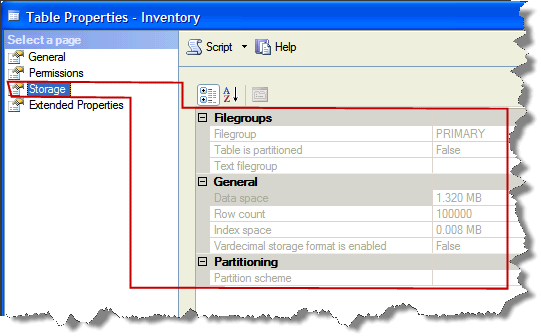SQL Server Edition: SQL Server 2005 w/ SP3 and 2008
Is there a built-in SQL Server stored procedures that will retrieve following information? Or a DMV (Dynamic Management View) would be great as well.
I am interested mainly on how to find out FILEGROUP data of a table specifically. But it'd be better if there was a sproc that will return all of following result.

By the way, is there any documents that shows one-to-one matching of how to retrieve data that SQL Server UI displays?
The system stored procedure sp_help could be a good starting point.
For example:
exec sp_help 'schema.TableName'
This will show you all kinds of goodness:
-- Script to analyze table space usage using the
-- output from the sp_spaceused stored procedure
-- Works with SQL 7.0, 2000, and 2005
set nocount on
print 'Show Size, Space Used, Unused Space, Type, and Name of all database files'
select
[FileSizeMB] =
convert(numeric(10,2),sum(round(a.size/128.,2))),
[UsedSpaceMB] =
convert(numeric(10,2),sum(round(fileproperty( a.name,'SpaceUsed')/128.,2))) ,
[UnusedSpaceMB] =
convert(numeric(10,2),sum(round((a.size-fileproperty( a.name,'SpaceUsed'))/128.,2))) ,
[Type] =
case when a.groupid is null then '' when a.groupid = 0 then 'Log' else 'Data' end,
[DBFileName] = isnull(a.name,'*** Total for all files ***')
from
sysfiles a
group by
groupid,
a.name
with rollup
having
a.groupid is null or
a.name is not null
order by
case when a.groupid is null then 99 when a.groupid = 0 then 0 else 1 end,
a.groupid,
case when a.name is null then 99 else 0 end,
a.name
create table #TABLE_SPACE_WORK
(
TABLE_NAME sysname not null ,
TABLE_ROWS numeric(18,0) not null ,
RESERVED varchar(50) not null ,
DATA varchar(50) not null ,
INDEX_SIZE varchar(50) not null ,
UNUSED varchar(50) not null ,
)
create table #TABLE_SPACE_USED
(
Seq int not null
identity(1,1) primary key clustered,
TABLE_NAME sysname not null ,
TABLE_ROWS numeric(18,0) not null ,
RESERVED varchar(50) not null ,
DATA varchar(50) not null ,
INDEX_SIZE varchar(50) not null ,
UNUSED varchar(50) not null ,
)
create table #TABLE_SPACE
(
Seq int not null
identity(1,1) primary key clustered,
TABLE_NAME SYSNAME not null ,
TABLE_ROWS int not null ,
RESERVED int not null ,
DATA int not null ,
INDEX_SIZE int not null ,
UNUSED int not null ,
USED_MB numeric(18,4) not null,
USED_GB numeric(18,4) not null,
AVERAGE_BYTES_PER_ROW numeric(18,5) null,
AVERAGE_DATA_BYTES_PER_ROW numeric(18,5) null,
AVERAGE_INDEX_BYTES_PER_ROW numeric(18,5) null,
AVERAGE_UNUSED_BYTES_PER_ROW numeric(18,5) null,
)
declare @fetch_status int
declare @proc varchar(200)
select @proc = rtrim(db_name())+'.dbo.sp_spaceused'
declare Cur_Cursor cursor local
for
select
TABLE_NAME =
rtrim(TABLE_SCHEMA)+'.'+rtrim(TABLE_NAME)
from
INFORMATION_SCHEMA.TABLES
where
TABLE_TYPE = 'BASE TABLE'
order by
1
open Cur_Cursor
declare @TABLE_NAME varchar(200)
select @fetch_status = 0
while @fetch_status = 0
begin
fetch next from Cur_Cursor
into
@TABLE_NAME
select @fetch_status = @@fetch_status
if @fetch_status <> 0
begin
continue
end
truncate table #TABLE_SPACE_WORK
insert into #TABLE_SPACE_WORK
(
TABLE_NAME,
TABLE_ROWS,
RESERVED,
DATA,
INDEX_SIZE,
UNUSED
)
exec @proc @objname =
@TABLE_NAME ,@updateusage = 'true'
-- Needed to work with SQL 7
update #TABLE_SPACE_WORK
set
TABLE_NAME = @TABLE_NAME
insert into #TABLE_SPACE_USED
(
TABLE_NAME,
TABLE_ROWS,
RESERVED,
DATA,
INDEX_SIZE,
UNUSED
)
select
TABLE_NAME,
TABLE_ROWS,
RESERVED,
DATA,
INDEX_SIZE,
UNUSED
from
#TABLE_SPACE_WORK
end --While end
close Cur_Cursor
deallocate Cur_Cursor
insert into #TABLE_SPACE
(
TABLE_NAME,
TABLE_ROWS,
RESERVED,
DATA,
INDEX_SIZE,
UNUSED,
USED_MB,
USED_GB,
AVERAGE_BYTES_PER_ROW,
AVERAGE_DATA_BYTES_PER_ROW,
AVERAGE_INDEX_BYTES_PER_ROW,
AVERAGE_UNUSED_BYTES_PER_ROW
)
select
TABLE_NAME,
TABLE_ROWS,
RESERVED,
DATA,
INDEX_SIZE,
UNUSED,
USED_MB =
round(convert(numeric(25,10),RESERVED)/
convert(numeric(25,10),1024),4),
USED_GB =
round(convert(numeric(25,10),RESERVED)/
convert(numeric(25,10),1024*1024),4),
AVERAGE_BYTES_PER_ROW =
case
when TABLE_ROWS <> 0
then round(
(1024.000000*convert(numeric(25,10),RESERVED))/
convert(numeric(25,10),TABLE_ROWS),5)
else null
end,
AVERAGE_DATA_BYTES_PER_ROW =
case
when TABLE_ROWS <> 0
then round(
(1024.000000*convert(numeric(25,10),DATA))/
convert(numeric(25,10),TABLE_ROWS),5)
else null
end,
AVERAGE_INDEX_BYTES_PER_ROW =
case
when TABLE_ROWS <> 0
then round(
(1024.000000*convert(numeric(25,10),INDEX_SIZE))/
convert(numeric(25,10),TABLE_ROWS),5)
else null
end,
AVERAGE_UNUSED_BYTES_PER_ROW =
case
when TABLE_ROWS <> 0
then round(
(1024.000000*convert(numeric(25,10),UNUSED))/
convert(numeric(25,10),TABLE_ROWS),5)
else null
end
from
(
select
TABLE_NAME,
TABLE_ROWS,
RESERVED =
convert(int,rtrim(replace(RESERVED,'KB',''))),
DATA =
convert(int,rtrim(replace(DATA,'KB',''))),
INDEX_SIZE =
convert(int,rtrim(replace(INDEX_SIZE,'KB',''))),
UNUSED =
convert(int,rtrim(replace(UNUSED,'KB','')))
from
#TABLE_SPACE_USED aa
) a
order by
TABLE_NAME
print 'Show results in descending order by size in MB'
select * from #TABLE_SPACE order by USED_MB desc
go
drop table #TABLE_SPACE_WORK
drop table #TABLE_SPACE_USED
drop table #TABLE_SPACE
Found a solution.
It seems like it takes longer to type this out than using UI to find out table FILEGROUP information.
Found through List tables in filegroups:
declare @objectid bigint
set @objectid = object_id('table_name')
exec sp_objectfilegroup @objectid
I became too lazy to type those three lines so ended up creating another stored procedure that takes table name instead.
create procedure spTableFileGroup
@TableName sysname
as
begin
if exists( select 1
from INFORMATION_SCHEMA.TABLES T
where T.TABLE_NAME = @TableName) begin
declare @objectid bigint
set @objectid = object_id(@TableName)
exec sp_objectfilegroup @objectid
end
else begin
print 'There is no table named "' + @TableName + '"'
end
end
GO
Usage
exec spTableFileGroup 'table_name'
GO
If you love us? You can donate to us via Paypal or buy me a coffee so we can maintain and grow! Thank you!
Donate Us With